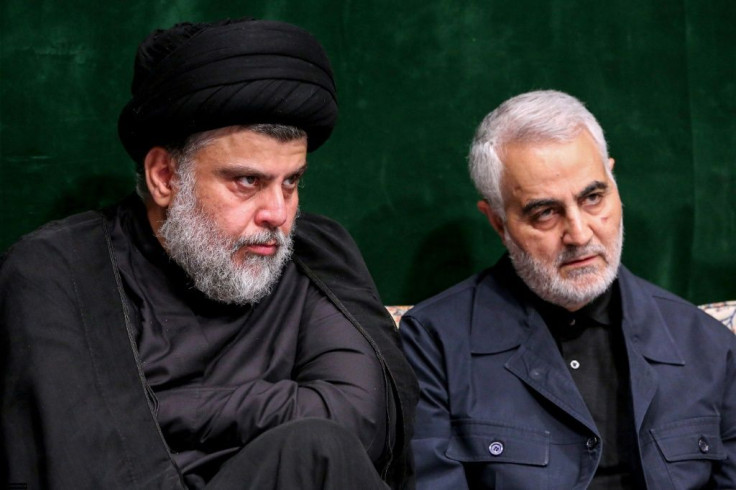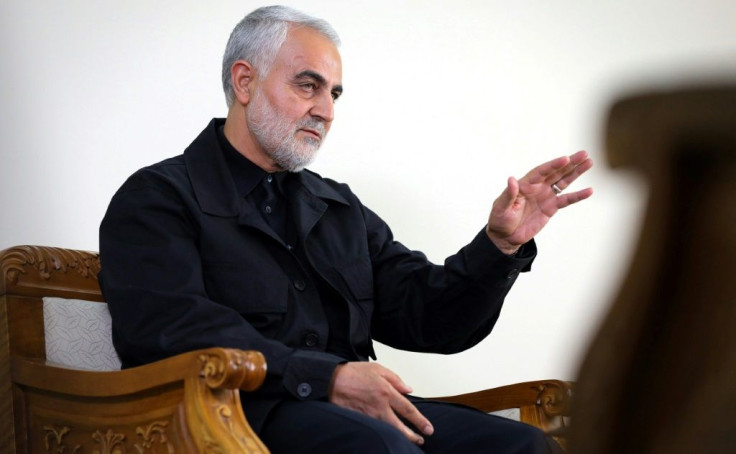Iranian Quds Force Commander Gen. Qasem Soleimani Assassinated On Trump's Orders
KEY POINTS
- General Qasem Soleimani's killing confirmed by Pentagon, says ordered by Trump
- Senior Iraqi Shiite commanders Abu Mahdi al-Muhandis and Mohammed Redha Al-Jabri also killed
- Trump tweets picture of American flag; Iran orders 3-day national mourning
- Rocket strike on convoy carried out by drone: Iraqi source
- Iran says U.S. will bear responsibility for the consequences of the killiings
The top commander of Iran's Revolutionary Guards-Quds Force, Gen. Qasem Soleimani, was assassinated in an airstrike just outside of the Baghdad airport shortly after midnight Thursday. The strike, which was ordered by President Donald Trump following the siege of the U.S. embassy in the Iraqi capital by members of Iranian-backed Shiite militias, also killed senior commanders of the militias, known as the Popular Mobilisation Forces (PMF).
Gen. Soleimani is widely recognized as the orchestrator of Iran's strategy to influence and shape Middle East politics through a string of proxy militias. His presence in Baghdad soon after the embassy siege is being linked to his control of the events.
Updated at 08:05 am EST, Jan. 3: President Trump, who had tweeted out the picture of the American flag soon after the news of the air strike broke, tweeted early morning Friday: "Iran never won a war, but never lost a negotiation!"
The U.S. embassy in Baghdad said all public consular operations are suspended until further notice. It added in a Facebook post that the U.S. Consulate General in Erbil is open for visa and American Citizen Services appointments.
See posts, photos and more on Facebook.
Iran's supreme leader Ayatollah Ali Khamenei ordered a three-day mourning in the country and said the killing of Gen. Soleiman will "double the motivation of the resistance against the United States and Israel."
Video shows moments after mass murderer Qassem Soleimani is targeted and killed with Abu Mehdi Muhandes, the head of Iranian regime’s proxy Bassij force in #Iraq and a notorious murderer #Iran pic.twitter.com/BAiIg9mNCo
— Hossein Abedini (@HoAbedini) January 3, 2020
#Iran leader condemns assassination of Gen. Soleimani, declares 3-day national mourning. Harsh vengeance awaits those criminals behind martyrdom of Gen. Soleimani. Resistance movement will press ahead with more strength pic.twitter.com/Rb5Be8CVx1
— Consulate General of I.R.Iran in Almaty,Kazakhstan (@IRANinALMATY) January 3, 2020

Although the Iranians have hyphenated Israel with the United States in their reactions to the killing of Gen. Soleiman, it is not clear what role, if any, the Israelis had in the drone strike Thursday night.
Also read: US Troops In Mideast Are Unwelcome Guests Fighting For Freedoms That No One Wants
Update at 23:40 EST: Israeli media quoted the PMF's spokesman Ahmed al-Assadi as blaming "Americans and Israelis" for the attack.
"The American and Israeli enemy is responsible for killing the mujahideen Abu Mahdi al-Muhandis and Qassem Soleimani," said Assadi.
Israel prime minister Benjamin Netanyahu cut short a visit to Greece and is heading back to Israel.
Qassem #Soleimani was responsible for the blood of many innocent civilians. He worked for the Iranian regime and played a major role in their crimes.
— Maryam (@maryaamhosseini) January 3, 2020
His death has brought us closer to a #FreeIran2020. What a great start to the new year!
Update at 23:12 EST: Iran's foreign minister Javad Zarif called the assassination of Gen. Qasem Soleiman an "extremely dangerous and foolish escalation."
"The US bears responsibility for all consequences of its rogue adventurism," he said in a tweet.
The US' act of international terrorism, targeting & assassinating General Soleimani—THE most effective force fighting Daesh (ISIS), Al Nusrah, Al Qaeda et al—is extremely dangerous & a foolish escalation.
— Javad Zarif (@JZarif) January 3, 2020
The US bears responsibility for all consequences of its rogue adventurism.
President Trump has not commented directly on the assassination but tweeted an American flag after the news broke.
Update at 22:59 EST: Lt. Chris Miller, a combat controller with the U.S. Air Force stationed in the Middle East, welcomed the killing of Gen. Qasem Soleimani. He told International Business Times: "The s**t will hit the fan for a month or so, but Iran as a whole will rise up. The youth will take power. We didn't start a war we finished several. We killed the serpent and now the region can heal."
The reaction of the service member facing the realities of the war in Iraq, above, is in stark contrast to reactions on social media questioning the wisdom of killing Gen. Soleimani.
President Trump, who had threatened the Iranians over the Baghdad embassy siege, has not yet reacted to the killing.
U.S. troops have gone into alert in the Middle East.
Update at 22:03 EST: Pentagon confirmed the killing of Iran's most senior commander Qasem Soleimani. The Deparment of Defense said in a press release that the air strike was carried out at the direction of President Donald Trump to protect American lives.
It said Soleimani, the top commander of the Quds Force and Iranian Revolutionary Guards orchestrated the attack on a U.S. airbase in Kirkuk that killed an American contractor, and also the siege of the U.S. embassy in Baghdad by Iranian-backed Shiite militias.
Full text of the statement below:
At the direction of the President, the U.S. military has taken decisive defensive action to protect U.S. personnel abroad by killing Qasem Soleimani, the head of the Iranian Revolutionary Guard Corps-Quds Force, a U.S.-designated Foreign Terrorist Organization.General Soleimani was actively developing plans to attack American diplomats and service members in Iraq and throughout the region. General Soleimani and his Quds Force were responsible for the deaths of hundreds of American and coalition service members and the wounding of thousands more. He had orchestrated attacks on coalition bases in Iraq over the last several months - including the attack on December 27th - culminating in the death and wounding of additional American and Iraqi personnel. General Soleimani also approved the attacks on the U.S. Embassy in Baghdad that took place this week.This strike was aimed at deterring future Iranian attack plans. The United States will continue to take all necessary action to protect our people and our interests wherever they are around the world.
Original story below:
A rocket strike on a convoy of vehicles near the Baghdad airport killed the leader of Iran's feared Quds Force, General Qasem Soleimani, and senior commanders of the Iranian-backed Popular Mobilization Forces of Iraq on Thursday night, a source with the Iraqi security forces said.
The death of Gen. Soleimani, a key player in Mideast politics and the orchestrator of Iranian influence in the region through proxies, was confirmed by Iraq's Popular Mobilization Forces (PMF), which said its deputy head Abu Mahdi al-Muhandis was also killed.

The source, who is with the Iraqi security forces and wished to remain anonymous, told International Business Times that the rockets detonated simultaneously and appeared to target a convoy of vehicles that were outside of a facility that housed American and Iraqi counter-terrorism forces. He said Mohammed Redha Al-Jabri, a senior Popular Mobilization Force official, was also killed along with his associates. In all, the strike killed eight people.
A suspected drone strike near Baghdad airport on Thursday night reportedly killed Qassem Soleimani, Iran’s most revered military leader.
— Ale (@aliasvaughn) January 3, 2020
This marks a sharp escalation in tensions between the U.S. and Iran.@highbrow_nobrowhttps://t.co/tkvSrIqq0G
The precision of the strikes pointed to a possible U.S. role, the source said. If that is confirmed, the strike would mark a sharp escalation in the tensions between the U.S. and Iran. The U.S. military scrambled helicopters following the attack soon after midnight, he said.
A source with the U.S. special operations community in Iraq said separately: "There are indications that the attack was staged as the vehicles that were hit were in motion, the precision that the strike was carried out with could have been the work of a drone if you know what I mean?"
The PMF, or the Hashed as it is known, is an umbrella organization of various Iraqi Shiite militias backed by Iran. During the war, in 2016, the PMF was made into an independent military force reporting directly to the Iraqi prime minister.
“High value” guests from the Rev Guards? https://t.co/ePbg0v0AaQ
— Alireza Nader علیرضا نادر (@AlirezaNader) January 2, 2020
The Quds Force is an arm of the Iranian Revolutionary Forces engaged in carrying out unconventional warfare across the world. Members of the Quds Force fought alongside the PMF against the Islamic State in Iraq and Syria.
The Quds Force is also widely considered to be behind the many recent attacks in Syria and Iraq against U.S. forces and the attack that targeted oil facilities in Saudi Arabia.
The Quds Force is reported to have used the war against the Islamic State and the recent popular unrest in Iraq to smuggle in and hide ballistic missiles in Iraq and Syria. Those missiles are considered a threat to U.S. forces and allies if a shooting war breaks out with Iran, and also to Israel.
Israeli military jets have previously targeted Iranian facilities and weapons stockpiles in Syria.
The strike that took out Gen. Soleimani follows the recent siege on the U.S. embassy in Baghdad by pro-Iranian protesters Tuesday, Dec. 31. Tensions in the area have remained high as 750 paratroopers from the 82nd Airborne division were sent to Kuwait shortly after the attack.
The siege was carried out in retaliation for U.S. air strikes on Iranian weapons caches in Iraq and Syria, following an attack on an U.S. base that killed an American contractor.
The Popular Mobilisation Front had given the call for the siege, saying it was a "message" to the Americans. President Donald Trump acted decisively following the siege and even threatened Iran that it will be held responsible for any damage to U.S. interests.
© Copyright IBTimes 2024. All rights reserved.






















